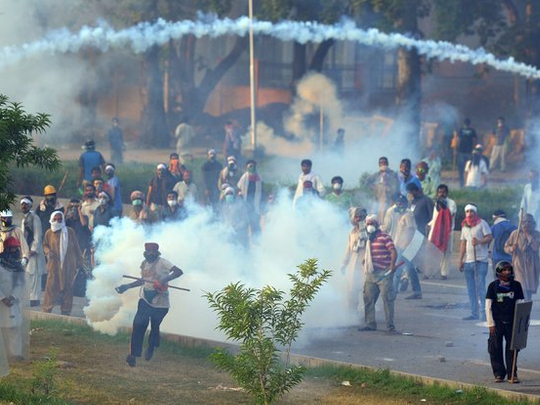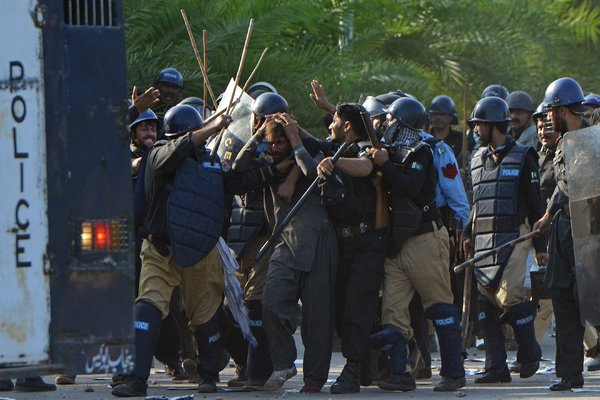
Islamabad, Pakistan: Pakistani paramilitary forces have escorted protesters out of the Islamabad headquarters of the state television channel PTV on Monday.
Opposition protesters have clashed with police near the prime ministers residence earlier as the political standoff capital escalated into a national crisis after clashes between the police and protesters attempting to storm the prime minister’s house.
The anti-government protesters stormed the state TV building on Monday, forcing the channel briefly off air as they clashed anew with police and pushed further into a sprawling government complex in the capital, Islamabad, in an effort to reach the prime minister's residence.
The violence is the latest in the turmoil roiling Pakistan, where anti-government cleric Tahir-ul-Qadri and cricketer-turned-politician Imran Khan have been leading twin protests since mid-August calling on Prime Minister Nawaz Sharif to resign. Over the weekend, three people died and hundreds were injured in what amounted to running street battles between the police and the demonstrators.
The rallies against Sharif constitute the biggest threat to his government little more than one year in office. Qadri and Khan allege widespread fraud in the country's May 2013 election, in which Sharif's party won by a landslide.
International observers found no evidence indicating rampant election tampering. Several rounds of negotiations between representatives of Khan and Qadri and the government have failed to make any headway.
The protests began with a march to Islamabad from the eastern city of Lahore on the country's Independence Day, Aug. 14. Once in the capital, the protesters camped out near the parliament, pushing their demands. Khan and Qadri had called for millions to join them but crowds at the most numbered tens of thousands at the height of the demonstrations.
The rallies initially remained peaceful, though they forced a lockdown of Islamabad and badly harmed the city's business life. Violence first erupted on Saturday, with police firing tear gas and clashing with protesters who pushed closer to the seat of government in the capital's Red Zone.
On Monday, Pakistani television showed images of the protesters and police clashing in various areas of the Red Zone, a sprawling complex of government buildings and grassy lawns in the center of Islamabad. The protesters, many of whom were wearing gas masks and were armed with batons, could be seen hurling rocks at policemen.
The protesters made it to a gate that surrounds the prime minister's residence where they were met by paramilitary Rangers and army troops. The gate is the first of at least two layers of security protecting the house and is a few hundred meters (yards) from the residence itself.
Once at the gate, the protesters staged a sit-in and did not appear to seek to go further as Qadri asked his followers to stay put.
Pakistan's state broadcaster said protesters also attacked its building, located in another area of the Red Zone. It went off the air briefly while private channels showed images of protesters inside the state TV building, moving through the corridors with sticks and clubs and smashing equipment as visibly nervous employees looked on.
Army troops and paramilitary Rangers then reached the building and began to clear it of protesters. As the TV came back on air, it broadcast images of protesters embracing the Rangers and agreeing to leave.
There were no immediate reports of injuries in Monday's violence.
Sunday protest turns deadly
On Sunday, three people died and at least were 500 wounded, raising the specter of a government collapse.
The violence, in which the police fired rubber bullets and tear gas at protesters armed with sticks, provoked an intervention from the military, which has a long history of seizing power during times of chaos. On Sunday evening, the army chief held an emergency meeting with the military high command, moving it up by a day as the situation in the capital, Islamabad, deteriorated rapidly.
In a statement afterward, the military stressed its commitment to democracy and urged rival politicians to resolve their differences “without wasting any time.”
But it also stated that “further use of force will only aggravate the problem,” an assertion that put further pressure on Prime Minister Nawaz Sharif by limiting his options to halt the chaos.
Thousands of protesters, led by the opposition politician Imran Khan and the cleric Muhammad Tahir-ul Qadri, have been camped out on the streets of Islamabad for more than two weeks in a bid to force Mr. Sharif to resign.
Sharif, who came to power in a landslide election victory just 15 months ago, has said those demands are “unacceptable” and “unconstitutional.” But he has failed to find a negotiated end to the deadlock, which has paralyzed the capital and left his government badly weakened.
In a sign of the seriousness of the standoff, Sharif requested on Thursday that the army chief, Gen. Raheel Sharif, help defuse the tensions, and the two men, who are not related, agreed to push for negotiations to resume.
But those talks collapsed over the weekend, and the protesters tried to leverage their position by seizing control of symbolically important ground. On Saturday evening, Khan and Qadri ordered their protesters to push through police lines in the capital’s “red zone” — a high-security area that includes the Parliament, the Supreme Court and many diplomatic missions.
Thousands of people stormed toward the prime minister’s official residence. Others cut through a barbed-wire fence surrounding Parliament and rammed a truck through a metal fence. In clashes that lasted through the night, paramilitary and police officers fired tear gas and rubber bullets at the demonstrators, who stopped their advance only when army troops stationed inside the buildings issued a warning.
The defense minister, Khawaja Muhammad Asif, said the government had been compelled to use force to protect important buildings that symbolised the state.
One protester fell into a ditch and died of a heart attack, said Waseem Khawaja, a spokesman at the Pakistan Institute of Medical Sciences hospital. Two others admitted to the hospital died from their injuries.
On Sunday, protesters erected tents on the sweeping lawns in front of the main Parliament building; nearby roads were littered with debris, and skirmishes between protesters and security forces continued throughout the afternoon.
Continue reading the main story
Mr. Khan made several speeches over the course of the day from atop a shipping container. “I am a terrorist to you, Nawaz Sharif, because you feel terror,” he said, in reference to criminal charges that the government has leveled against Mr. Khan.
Mr. Khan has said he started the demonstrations to protest what he says was rigging in last year’s election. But the chaotic scenes in Islamabad over the weekend led to worries that he might derail Pakistan’s fragile democracy by creating the opportunity for a military intervention.
Those worries came even from his own ranks. In a news conference on Sunday, Javed Hashmi, the president of Mr. Khan’s Pakistan Tehreek-e-Insaf party, lashed out at Mr. Khan’s decision to escalate the protest on Saturday night, and effectively announced that he was quitting the party. Mr. Hashmi said Mr. Khan had overruled the senior party leaders who opposed his decision, and suggested that Mr. Khan had been influenced by a “signal” from outside, an apparent reference to military intervention.
“Imran Khan will be responsible if martial law is imposed in the country,” Mr. Hashmi told reporters.
Later on Sunday, Mr. Khan said in a speech that he was “upset” by Mr. Hashmi’s statements. “From today our paths are separate,” he said.
Prime Minister Sharif reached Islamabad from Lahore on Sunday for talks with cabinet ministers. A senior official in the government, speaking on the condition of anonymity because he was not authorized to speak publicly about its plans, said the government did not intend to arrest Mr. Khan or Mr. Qadri but was planning to “push them out of the red zone.”
The military has seized power in Pakistan four times since 1958, usually at moments of upheaval in the political system. That history is particularly significant for Mr. Sharif, whose last stint in power ended in 1999 with a military coup led by Gen. Pervez Musharraf.
This time, Mr. Sharif came to power with a sweeping mandate after his party’s landslide win in May 2013, by promising to strengthen civilian supremacy. But this year he has clashed with the military on several key issues like peace talks with the Taliban and policy toward India.
Sharif also angered the military leadership by pursuing treason charges against General Musharraf and preventing him from leaving the country. Mr. Sharif’s supporters see the current turmoil as part of a military scheme to bring their leader to heel, if not to oust him entirely.
Some independent analysts agree with that view, while others see the upheaval as the product of a naked power grab by the two protest leaders. “Things have taken the ugly turn Imran Khan and Qadri needed it to,” said Mosharraf Zaidi, a political commentator based in Islamabad. “Those who can’t win elections need upheaval to come into power.”
By Sunday evening, Constitution Avenue, the main road linking Parliament to other major government buildings in central Islamabad, resembled a war zone. The police fired sporadic volleys of tear gas at groups of protesters, who in turn attacked them with bricks pulled from the sidewalk. Demonstrators set fire to trees and to a shipping container that blocked a road leading to an office housing several key ministries.
Continue reading the main story Continue reading the main story
Continue reading the main story
Amid the chaos, Qadri, an enigmatic cleric whose devoted following has provided the backbone of the demonstrations, delivered yet more speeches. Normally based in Canada, he has a small political party with no seats in Parliament.
Unlike Khan, who wants fresh elections, Qadri has called for a unity government to replace Sharif’s administration. Critics say that call suggests Mr. Qadri has ties to the military, which he denies.
Clusters of Khan’s supporters took positions on several roads in Islamabad and tried to block traffic. They also protested in Khan’s home city, Lahore.
After meeting with senior advisers, Sharif called a joint session of the lower and upper houses of Parliament for Tuesday.
In a television interview on Saturday, Asmatullah Junejo, a senior police official in Islamabad, apologized for “excessive force.” But he underscored that Pakistani law did not allow for protests in front of the prime minister’s official residence, and urged Mr. Qadri and Mr. Khan to exhibit restraint. “The red lines will be secured,” Mr. Junejo said.













